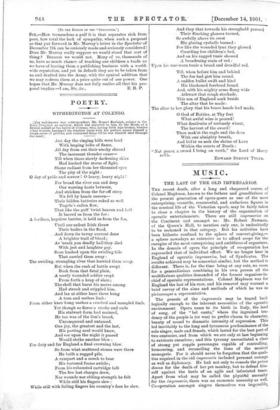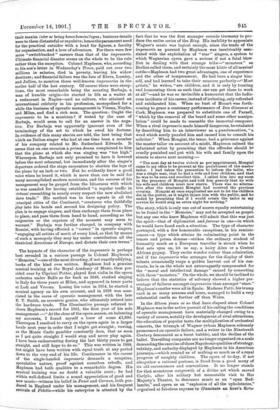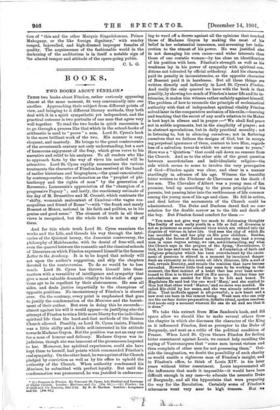M USIC.
THE LAST OF THE OLD IMPRESARIOS.
THE recent death, after a long and chequered career, of Colonel Mapleson, known to the fathers and grandfathers of the present generation of opera-goers as one of the most enterprising, versatile, resourceful, and audacious figures in the musical life of the Victorian epoch, may be fairly taken to close a chapter in the history of the organisation of operatic entertainments. There are still impresarios on the Continent and amongst us : Mr. Robert Newman, of the Queen's Hall, to mention only one, is undoubtedly to be reckoned in that category. But his activities have been hitherto confined to the sphere of concert-giving,-- a sphere nowadays so extensive as to afford scope for the energies of the most enterprising and ambitious of organisers. In the domain of opera the principle of co-operation has superseded that of individual effort. We no longer hear in England of operatic impresarios, but of Syndicates. The results achieved may be somewhat similar, but the method is different. There is, for the time being at any rate, no room for a generalissimo combining in his own person all the multifarious qualities demanded of the former organiser-in- chief of operatic representations. Colonel Mapleson was for England the last of his race, and his removal may warrant brief survey of the aims and methods of which he was so picturesque a representative.
The genesis of the impresario may be traced back logically enough to the inherent necessities of the operatic environment. Opera came to its birth in Italy, the land of song, of the " bel canto," where the ingrained ten- dency of the people is (or was) to prefer charm to character, beauty of sound to dramatic intensity of expression. This led inevitably to the long and tyrannous predominance of the solo singer, male and female, which lasted for the best part of two centuries, and from which we are only at last beginning to extricate ourselves ; and this tyranny necessitated a class of strong yet supple personages capable of controlling, humouring, and reconciling the lions of the musical menagerie. For it should never be forgotten that the quali- ties required in the old impresario included personal courage as well as diplomacy. He had not only to console the prima donna for the death of her pet monkey, but to defend him- self against the heels of an agile and infuriated tenor. Apart from what may be called the physical necessity for the impresario, there was an economic necessity as well. Co-operation amongst singers themselves was impossible, their maxim inter se being homo homini lupus; business details were to them distasteful or repulsive; hence the paramount need for the practical outsider with a head for figures, a faculty for organisation, and a love of adventure. For there were few more " switchbacked " careers than that of the impresario. Ultimate financial disaster seems on the whole to be the rule rather than the exception. Colonel Mapleson, who, according to his son's letter in Wednesday's Times, paid out over two millions in salaries, died in poverty, leaving his widow destitute; and financial failure was the fate of Ebera, Lumley, and Jullien, to mention three well-known impresarios in the earlier half of the last century. Of course there were excep- tions, the most remarkable being the amazing Barbaja, a man of humble origin—be started in life as a waiter at a restaurant in Naples—and no culture, who attained an international celebrity in his profession, monopolised for a while the business of operatic management in Vienna, Naples, and Milan, and died a rich man. The question: Ought the impresario to be a musician ? if tested by the case of Barbaja, would seem to call for an answer in the nega- tive. For Barbaja was apparently ignorant even of the terminology of the art to which he owed his fortune. In evidence of this many stories are told, the best being that which an Italian singer who had at one time been a member of his company related to Mr. Sutherland Edwards. It seems that on one occasion a prima donna complained to him that the piano at which she was singing was "too high." Whereupon Barbaja not only promised to have it lowered before the next rehearsal, but immediately after the singer's departure ordered the stage carpenters to shorten the legs of the piano by an inch or two. But he evidently knew a good voice when he heard it, which is more than can be said for many accomplished modern musicians, and the success of his management may be gauged from the bitterness with which he was assailed for having established "a regular traffic in rirtuosi resembling in nearly every respect the now abolished ;lave trade." His method was to have agents in all the principal cities of the Continent, "creatures who faithfully play into his hands and second his designing policy. The plan is to engage singers, and then exchange them from place to place, and pass them from hand to hand, according as the exigencies or the caprices of the moment may seem to warrant." Barbaja was further charged, in company with Rossini, with having effected a " corner " in operatic singers, "engaging all artists of merit of every kind, so that by means of such a monopoly they may lay under contribution all the theatrical directions of Europe, and dictate their own terms."
• The keynote of the character of the impresario is perhaps best revealed in a curious passage in Colonel Mapleson's "Memoirs,"—one of the most diverting, if not exactly edifying, books of the kind ever written. Mapleson had a genuine musical training at the Royal Academy of Music, then pre- sided over by Cipriani Potter, played first violin in the opera orchestra under Balla as far back as 1848, studied singing in Italy for three years at Milan, and appeared in tenor parts at Lodi and Verona. Losing his voice in 1854, he started a musical agency on his own account, and in 1858 was asso- ciated in the cares of operatic management with the late E. T. Smith, an eccentric genius, who ultimately retired into the hardware trade. The illuminative passage referred to 3loses Mapleson's record for 1861, the first year of his sole management :—" At the close of the opera season, on balancing my accounts, I found myself a loser of some 21,800. Thereupon I resolved to carry on the opera again in a larger locale next year in order that I might get straight ; vowing, as the Monte Carlo gambler constantly does, that as soon as I got quite straight I would stop and never play again. I have been endeavouring during the last thirty years to get straight, and still hope to do so." This was written in 1888, but might have been written with equal truth at any period down to the very end of his life. Continuance in the career of the single-handed impresario demands a sanguine, speculative nature, proof against countless rebuffs, and Mapleson had both qualities to a remarkable degree. His musical training was no doubt a valuable asset ; he had within well-defined limits a sound appreciation of good and new music--witness his belief in Faust and Carmen, both pro- duced in England under his management, and his frequent torivals of Fidelio—while his enterprise is attested by the
fact that he was the first manager outside Germany to pro- duce the entire series of the Ring. His inability to appreciate
Wagner's music was logical enough, since the trade of the impresario as pursued by Mapleson was inextricably asso- ciated with the exploitation of " star " singers, a system to which Wagnerian opera gave a serious if not a fatal blow.
But in dealing with that strange tribe—" monsters" as Berlioz called them, and certainly the most kittle of all musical
cattle—Mapleson had two great advantages, one of experience and the other of temperament. He had been a singer him- self, and had learned to take their measure perfectly—" Most artists," he writes, "are children, and it is only by treating and humouring them as such that one can get them to work
at all "—and he was so invincible a humourist that the ludic-
roue incidents of his career, instead of irritating, only refreshed and exhilarated him. When no bust of Mozart was forth- coming to grace a centenary performance of Don Giovanni at Cork, Mapleson was prepared to substitute one of Parnell, "which by the removal of the beard and some other manipu- lation " could be made to resemble the immortal composer. When a rival impresario made himself dangerous, he retaliated by describing him to an interviewer as a guastamestiere, "a word which sorely puzzled him and caused him to consult his solicitor." When Mongini, the tenor, had a grievance against the master tailor on account of a misfit, Mapleson calmed the infuriated artist by promising that the offender should be cruelly punished and put with his wife and family upon the streets to starve next morning:—
" The next day at twelve o'clock as per:appointment, Mongini came to my office to be present at the punishment of the master tailor. I had taken the precaution to inform the tailor, who was a single man, that he had a wife and four children, and that he was to be sure and recollect this. I called him into my room in the presence of Mongini and told him gravely that he with his wife and children must now starve. There was no alterna- tive after the treatment Mongini had received the previous evening. Mongini at once supplicated me not to let the children die in the gutter, as it might injure him with the public, and he ended by promising that if I would retain the tailor in my service he would sing an extra night for nothing."
The story, which is only one out of scores equally entertaining to be found in the "Memoirs," may not be accepted as gospel, but any one who knew Mapleson will admit that this was just the spirit—that of diplomatist and farceur in one—in which he would have faced such a situation. The type of character portrayed, with a few honourable exceptions, in his reminis-
cences—a type which attains its culminating point in the tenors and prima donnas—strikes the ordinary student of humanity much as a European traveller is struck when he first sets eyes on, let us say, a hairy Ainu or a Central African pygmy. They excite wonder rather than admiration, and if the impresario who arranges for the display of their talents occasionally reaps a golden harvest out of his con- tracts, he is on the whole not extravagantly compensated for the "moral and intellectual damage" caused by consorting with these "monsters." On the whole, we should be inclined to believe that the statistics of solvency showed a higher per- centage of failures amongst impresarios than amongst "stars." Mapleson's castles were all in Spain: Madame Patti, his trump
card in so many seasons and tours, managed to build a very substantial castle no further off than Wales.
In the fifteen years or so that have elapsed since Colonel Mapleson was in the active pursuit of his calling the conditions of operatic management have materially changed owing to a variety of causes, notably the development of rival attractions, the education of popular taste, the multiplication of orchestral concerts, the triumph of Wagner (whom Mapleson solemnly pronounced an operatic failure, and a writer in the Nineteenth Century denounced as a burst bubble), and the decline of the ballet. Travel ling companies are no longer organised on a scale demanding the exercise of those Napoleonic qualities of strategy, subtlety, and audacity displayed by Mapleson in his American
journeys,—which remind us of nothing so much as of a royal progress of naughty children. The opera of to-day, if not altogether a rational pastime, is freed from a good many of its old excrescences and conventions. It no longer stands for that monstrous outgrowth of a divine art which moved Carlyle, after his solitary but memorable visit to Her Majesty's Theatre, to denounce music as an "open Bed- lamite," and opera as an "explosion of all the upholsteries," organised at fabulous expense to ilJuminatA an hour's flirts.. tion of "this and the other Marquis Singedelomme, Prince Mahogany, or the like foreign dignitary," with sundry rouged, bejewelled, and high-dizened improper females of quality. The acquiescence of the fashionable world in the darkening of the auditorium is in itself a notable sign of the altered temper and attitude of the opera-going public.
C. L. G.
















































 Previous page
Previous page